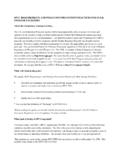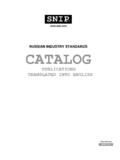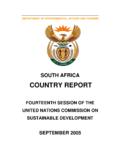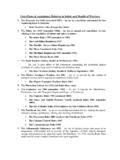Transcription of Offshore Cranes and Lifting Appliances - AMEM
1 Offshore Cranes and Lifting AppliancesInternational & European Maritime Legislationand Standardisation with special emphasis on theNorwegian petroleum activities sector3rdEditionDecember 2011 2011 by J. R. 2 NORWAY Offshore Cranes and Lifting AppliancesTable of content1. GeneralNorwegian petroleum Act, Storting(Parliament), Ministry of petroleum andEnergy2. Regulators2a. NorwayMinistry of petroleum and Energy (MPE) Oil and Gas Department Norwegian petroleum Directorate (NPD) petroleum Activities Act Health, Safety and Environment petroleum Safety Authority (PSA) Standard Norway (SN) NORSOK Directorate of Mining (DMF) Geological Survey of Norway (NGU) Norwegian Society of Lifting Technology(NSLT) Kranteknisk Forening (KTF) Offshore Mechanical Handling EquipmentCommittee (OMHEC) North Sea Offshore Authorities Forum(NSOAF) Labour Organisation (ILO) ILO Convention C 152 ILO Recommendation R 1602c.
2 International Maritime Organisation(IMO) ISM MARPOL MODU SOLAS 2d. Europe European Commission DG Enterprise & Industry Machinery Directive 2006/42/EC European Committee for StandardizationComit Europ en de Normalisation (CEN)Europ isches Komitee f r Normung European StandardsEN I3852-1:20042e. United States American petroleum Institute (API) Bureau of Ocean Management, Regulation,and Enforcement (BOEMRE) United States Coast Guard (USCG) Occupational Safety and HealthAdministration (OSHA)3. Recognised Organisations Classification Societies International Association of ClassificationSocieties (IACS) Det Norske Veritas (DNV)4.
3 Norwegian Offshore Industry Norwegian Oil Industry Association (OLF) Statoil BP Norge (BPN) Norwegian Rederiforbund (NR) 5. Maritime Authorities Norwegian Maritime Authority (NMA)6. Accident and casualty investigationboardsAccident and Investigation Board Norway(AIBN)7. International Standards American petroleum Institute (API) DIN EN ILO ISO VDI 8. Abbreviations and GeneralIn 2008, Norway was ranked as the sixth largest oilexporter and the eleventh largest oil producer in theworld. Norway was the second largest gas exporterto Europe. The country accounts for 30 percent ofall gas production in the world, and is the fifth largestproducer of gas.
4 The total recoverable resources atthe shelf amount approximately to billion standard cubic meters oil equivalents. After 40 yearsof production, nearly sixty percent of the expectedresources remain to be produced. Eight percent ofthe labour force is directly or indirectly employed bythe country s petroleum industry. The petroleum sector is driven by technologicalinnovation and the goal of maximising the values(profits) of the NCS Norwegian Continental Shelf. The Storting(Norwegian Parliament) has beenestablishing the framework for the Norwegianpetroleum activities as described in several StortingWhite Papers.
5 The Storting supervises theGovernment and the public administration. TheGovernment holds the executive power over thepetroleum policy and is responsible vis-a-vis theParliament. In applying the policy, the Government issupported by the Ministries and their subordinatedirectorates and agencies. The principal Norwegian legislation governing thepetroleum activities in Norway consists of the Norwegian petroleum Actand the Norwegian petroleum Taxation ActUnder the Norwegian petroleum Act, the Ministryof petroleum and Energy (MPE)is responsible for resource management and for administeringpetroleum activities on the Norwegian to the new Health, Safety andEnvironment (HSE) regulations entered into forceon 1 January 2011, the new term for continentalshelf or the shelf is Offshore .
6 Seite 3 NORWAY Offshore Cranes and Lifting AppliancesStortinget (Parliament)The GovernmentMinistry of Petroleumand Energy Ministry of theEnvironment Ministry ofLabourThe PetroleumSafety AuthorityNorwayThe NorwegianCoastalAdministrationThePetrole umTay OfficeGovernmentPension FundGlobal Ministry of Fisheriesand Coastal Affairs Ministry ofFinanceClimate andPollutionAgencyThe NorwegianPetroleumDirectoratePetoro ASGassco ASStatoil ASAS tate organisation of the petroleum activities (Source: Ministry of petroleum and Energy) 4 NORWAY Offshore Cranes and Lifting Appliances2. Regulators2a.
7 NorwayMinistry of petroleum and Energy (MPE)Einar Gerhardsens plass 1 Postboks 8148 Dep,0033 OsloNorwayTelephone+ 47 22 24 90 90 Telefax+ 47 22 24 95 65 principal responsibility of the Ministry ofPetroleum & Energy is to achieve a coordinated andintegrated energy policy. The MPE is responsible forresource management and for the sector as awhole. The Ministry has four departments. The mostimportant department, of a total of four, is: Oil and Gas Department (OG)Telephone+ 47 22 24 62 09 Telefax+ 47 22 24 27 78 The department consists of five sections: Exploration (LS)Opening of new areas on the NCS NorwegianContinental Shelf for petroleum activities Development and Production (UDR)Monitoring of development, production anddecommissioning of oil and gas fields on theNCS Norwegian Continental Shelf Gas and Infrastructure (GI)Monitoring of the gas infrastructure.
8 Analysis and Markets (AM)Economical analysis of petroleum activities petroleum Law and Legal Affairs (PJS)Juridical questions related to petroleum and contracts, laws, regulations and frameworks for petroleum activities. The Norwegian petroleum Directorate (NPD)OljedirektoratetProfessor Olav Hanssens vei 104021 StavangerNorway Telephone+ 47 51 87 60 00 Telefax+ 47 51 55 15 GjertsenResource Management+ 47 51 87 64 85 The NPD is administratively subordinate to the MPEand plays a key role in the petroleum resourcemanagement. It is an advisory body for the NPD exercises authority in connection with theexploration and production of petroleum deposits onthe NCS, including statutory powers and to makedecisions based on the rules and regulations governing the petroleum activities (PetroleumActivities Act) The regulations come as Acts, RoyalDecrees ( the King ) and NPD Regulations.
9 Remark:The NPD does not have any role within HSEmanagement! For HSE see PSAP etroleum Activities ActAct 29 November 1996 No. 72 relating to petroleumactivities. Last amended by Act 19 June 2009 No 1041996 The Norwegian petroleum resource managementregime is characterised by the use of principle-based legislation, as reflected in the PetroleumActivities Act 1996 (Norway). This law sets out framework conditions to guide the formulation ofacceptable commercial incentives in concessioncontracts granted to private businesses for undertaking exploration and operations in Norway are subject toextensive regulation with regard to health, safetyand the environment.
10 5 NORWAY Offshore Cranes and Lifting AppliancesThe Facilities Regulations 2005 Health, Safety and Environment in the petroleum activities (HSE)Under the petroleum Act, which is administered bythe Ministry of petroleum and Energy, petroleumoperations must be conducted in compliance with a reasonable standard of care, taking into consideration the safety of employees, the environment and the economic values representedby installations and vessels. The petroleum Act specifically requires that petroleum operations becarried out in such a manner that a high level ofsafety is developed and maintained in accordancewith the latest technological developments.
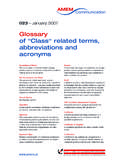
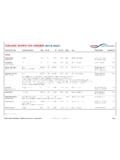
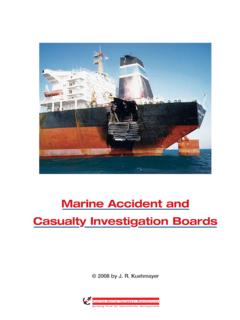
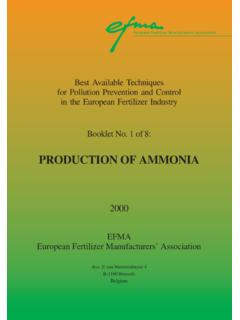

![1[SCHEDULE VI] - Welcome to Central Pollution …](/cache/preview/d/6/4/6/4/2/4/9/thumb-d6464249d79972a2e804a0aa4573c697.jpg)
